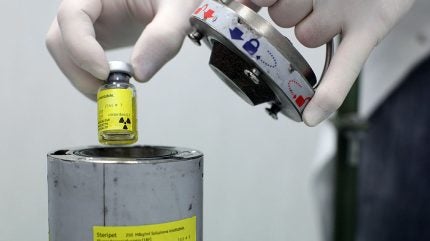
SK Biopharmaceuticals has in-licensed its second radiopharmaceutical – this time from a US-based academic organisation – in a bid to enhance its oncology pipeline.
Through its deal with the Wisconsin Alumni Research Foundation (WARF), the South Korean biotech has acquired the institution’s carbonic anhydrase IX (CA9)-targeting preclinical asset, WT-7695.

Discover B2B Marketing That Performs
Combine business intelligence and editorial excellence to reach engaged professionals across 36 leading media platforms.
Although financial details of the deal were not disclosed, SK now has the exclusive global rights to develop, manufacture and market WT-7695, which was previously forged in collaboration with the University of Wisconsin-Madison.
WT-7695 is a small molecule radiopharmaceutical that targets and binds to the transmembrane protein, CA9, which plays a key role in maintaining intracellular pH.
The target is highly expressed in clear cell renal cell carcinoma (ccRCC) and a variety of solid tumour types, including pancreatic and colorectal cancer while demonstrating low expression in normal tissues. Under hypoxic conditions, CA9 often contributes to cancer cell growth and metastasis.
According to SK, preclinical studies involving WT-7695 demonstrate the drug’s potential to become a “best-in-class radiopharmaceutical candidate”.

US Tariffs are shifting - will you react or anticipate?
Don’t let policy changes catch you off guard. Stay proactive with real-time data and expert analysis.
By GlobalDataFollowing its acquisition of the radiopharmaceutical, SK will conduct global clinical trials, which will be conducted in the US.
SK’s deal with the WARF follows the company’s call to license neurotensin receptor 1 (NTSR1)-targeting radiopharmaceutical, SKL35501, from Full-Life Technologies in July 2024.
These oncology deals add a new area of focus to SK’s pipeline, which is primarily dedicated to drugs targeting the central nervous system (CNS). WT-7695 and SKL35501 are joined by a p300 degrader – currently in the discovery stage – in SK’s oncology portfolio.
CA9 target takes APAC’s fancy
While CA9 remains a relatively new target within the oncology field, certain institutions and companies across the Asia-Pacific (APAC) region are betting on the target.
This includes Australian biopharma company Telix Pharmaceuticals, which is currently planning to conduct its first in-human study on its radionuclide drug conjugate (RDC) hopeful, TLX-252. According to GlobalData’s Pharmaceutical Intelligence Center, the trial is set to initiate in 2026.
GlobalData is the parent company of Clinical Trials Arena.
Meanwhile, Japanese biotech PeptiDream filed an investigational new drug (IND) application with the US Food and Drug Administration (FDA) on 25 November for its CA9-binding radiopharmaceutical, [225Ac]PD-32766. If approved, this will see the candidate enter Phase I trials in ccRCC.
PeptiDream has worked closely with Novartis since 2010, following the Swiss big pharma’s keen interest in radioligand therapies (RLTs). The pair recently expanded their drug discovery deal in 2024.
Outside of the radiopharmaceutical niche, the Xuzhou Medical University is also looking to harness CA9 as a target in a Phase I interventional study. The trial is evaluating the potential of a CA9 CAR-T therapy in advanced RCC.




